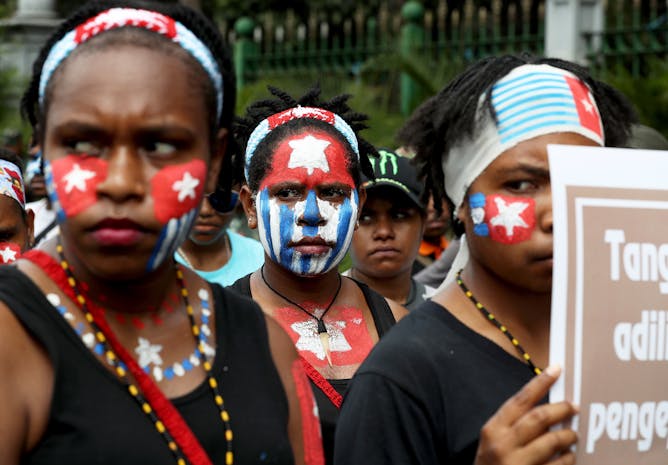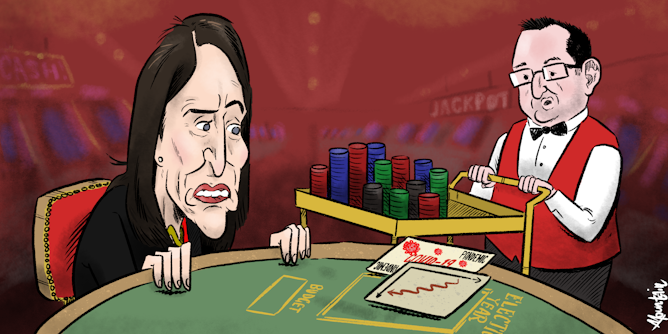|
|
|
Editor's note
|
|
Until this week, throughout 40 years of droughts, floods, economic crises and recessions, the worst that had ever happened to total Australian employment in any one month was a drop of 75,000.
The drop for April, released yesterday, was more than half a million – 594,300 – taking the number of Australians in work down from a high of 13 million to 12.4 million, in just one month.
And as Jeff Borland points out this morning, the rules used by the Bureau of Statistics in compiling the figures mean they massively understate what’s happened.
Still counted as employed are the people who have taken paid or unpaid leave, or been stood down but expect to return. And the 4.7 million on JobKeeper.
Borland says the best way to get a handle on the full extent of what’s happened is to look at total hours worked. (This gets around the Bureau’s much-criticised practice of counting someone who works for one hour a week as “employed”).
Total hours worked are down 9.2% in one month. The hours worked in full-time jobs fell only 6.3%. The hours worked in part-time jobs – those highly likely to be worked by women and young people in hospitality and retail – fell by almost a quarter.
P.S. As we approach the end of our second week of our annual donation campaign, a big thank you to the 6,464 (and counting!) readers who have so generously donated. This year, your support matters more than ever. Thank you.
|
Peter Martin
Section Editor, Business and Economy
|

|
|
Top stories
|

ABS
Jeff Borland, University of Melbourne
Women have suffered much more than men. Many who were employed in March have withdrawn from the labour force and so aren't counted as unemployed.
|

BAGUS INDAHONO/EPA
Camellia Webb-Gannon, University of Wollongong; Jaime Swift, University of Oxford; Michael Westaway, The University of Queensland; Nathan Wright, The University of Queensland
To bring attention to the renewed conflict in West Papua, Australian researchers are going back decades to document incidents of violence in a new mapping project.
|

www.shutterstock.com
Alexandra Wake, RMIT University
BuzzFeed was more than just listicles and funny quizzes. It also produced quality journalism in innovative ways.
|

Wes Mountain/The Conversation
Grant Duncan, Massey University
Jacinda Ardern has won global admiration for her personal style. But how will Kiwis judge her government at the ballot-box in September this year – just as unemployment is expected to peak?
|

Mick Tsikas/AAP
Michelle Grattan, University of Canberra
Just a year ago, Scott Morrison was on the cusp of achieving what most had believed impossible. His ability as a campaigner, aided by the failure of his opponent to connect with the Australian public and…
|
Politics + Society
|
-
Tony Walker, La Trobe University
Scott Morrison has made a diplomatic blunder in leading the push for an inquiry into the origins of coronavirus. There is much at stake, and he now needs to find a diplomatic way out.
-
Susan Carland, Monash University
There are already disturbing reports of racism against Asian Australians. History shows this will get worse in a recession, unless our political leaders step in.
|
|
Environment + Energy
|
-
Frank Jotzo, Australian National University; Mousami Prasad, Australian National University
Emissions from Australia's electricity sector have dropped markedly during the pandemic.
But a recession could cloud the renewables outlook.
|
|
Business + Economy
|
-
Richard Holden, UNSW
Government rules do more than simply define what is permissible. They also signal information that influences public behaviour in other areas of life.
-
Jonathan Boston, Te Herenga Waka — Victoria University of Wellington
The 2020 "Rebuilding Together" budget rightly targets a looming unemployment crisis, but just how bad that will be remains uncertain.
-
Danielle Wood, Grattan Institute; Nathan Blane, Grattan Institute
Every one of Australia's coronavirus support payments is due to end by the end of October. It'll leave a gaping hole.
|
|
Cities
|
-
Sandra Carrasco, University of Melbourne; Neeraj Dangol, University of Melbourne; Redento B. Recio, University of Melbourne
Months after Typhoon Washi tore through the Philippines in 2011, relocated residents were moving into newly built housing. They soon began modifying and extending homes that didn't meet their needs.
|
|
Health + Medicine
|
-
Paul De Barro, CSIRO
A CSIRO survey has found many people are confused about common infections, believing antibiotics can treat colds, flu and other viruses. This could fuel a dangerous rise in drug-resistant superbugs.
-
Robin Gauld, University of Otago
NZ$4.3 billion will go some way to patch up long-standing cracks in New Zealand's health system. But COVID-19 has shown NZ's regional approach to health isn't good enough against a nationwide threat.
-
Larisa Labzin, The University of Queensland
Nearly two million antibody tests imported into Australia can't be used to diagnose COVID-19. But it's difficult to make an antibody test that is specific and sensitive enough.
|
|
Education
|
-
John Stanwick, National Centre for Vocational Education Research (NCVER); Cameron Forrest, National Centre for Vocational Education Research (NCVER); Emerick Chew, National Centre for Vocational Education Research (NCVER)
There are five transitions young people aged 16-25 make between school and employment. Most involve some vocational education and training. Some involve university and others no education at all.
-
Rachel Wilson, University of Sydney; William Mude, CQUniversity Australia
A survey of 10,000 public school teachers in NSW looked at how they felt about being at school at the end of term one, their thoughts on remote learning and their feelings about returning to school.
|
|
Arts + Culture
|
-
Claire Smith, Flinders University; Amanda Kearney, Flinders University; Anna M. Kotarba-Morley, Flinders University; Christopher Wilson, Flinders University; Julian Grant, Charles Sturt University; Kellie Pollard, Charles Darwin University; Udoy Saikia
Researchers report on how COVID-19 is affecting isolated Indigenous communities. Their voices bridge the urban divide, reveal challenges and describe some unexpected bonuses.
|
|
| |
Featured jobs
|
|
|
| |
| |
| |

|
| |
| |
| |
Featured Events & Courses
|

|
Level 21, 15 Broadway, Ultimo, New South Wales, 2007, Australia — University of Technology Sydney
|

|
Level 21, 15 Broadway, Ultimo, New South Wales, 2007, Australia — University of Technology Sydney
|

|
Melbourne (Venue TBC), Melbourne, Victoria, 3000, Australia — Australia New Zealand School of Government
|

|
Online webinar, Melbourne, Victoria, 3010, Australia — University of Melbourne
|
|
|
|
| |
| |
| |
| |
| |
|
|
|
|
|
|
|